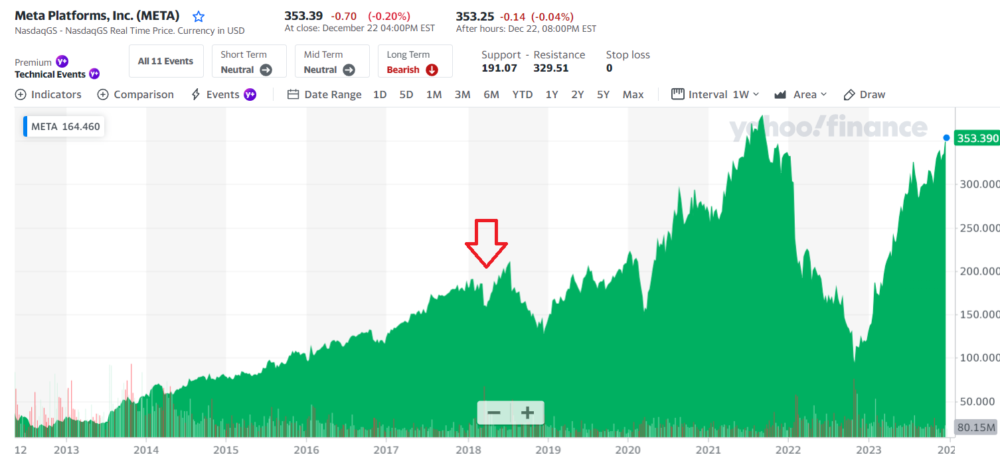
People invest as a means of securing their financial future, providing them with a source of money at the right time.
Outside of retirement accounts, you typically have a lot of power when it comes to choosing to cash out your investments. But how do you choose the right time to cash out of your investments?
Determining when to cash out your investments is a personal decision. You have to examine your current circumstances and goals to figure out what is right for you. However, there are some situations where cashing out may be a smart move.
Buy Low, Sell High
When it comes to managing a stock portfolio, you always want to focus on buying low and selling high. Typically, if a disaster strikes a company, their stock values will fall. At times, this triggers a sizeable sell-off, driving prices down for hours, days, weeks, or longer.
If this happens, it can be tempting to jump ship as well. However, you also need to avoid panic-based decision-making if you want to come out ahead.
For example, after the Cambridge Analytica Facebook scandal, Facebook’s stock value plummeted, losing around $134 billion in value at the low on March 26, 2018.

However, by early May, all of those losses were recovered. If you cashed out your investment near the low, you’d likely be regretting that decision. Now if you’d bought instead of sold when that price hit the low point, you’d be golden.
Before You Cash Out of Your Investments
Assuming one of the companies you own shares in has an issue similar to Meta, you need to determine whether the negative incident relating to the company is recoverable. While this can be hard to predict for certain, it is important that you think logically about the situation.
In some cases, you can determine whether a company may survive a downturn based on the nature of the scandal. Incidents that bring about criminal charges for corruption, money laundering, or similar activities can spell doom for a business. If that occurs, you might want to pull your money out quickly. Otherwise, there might not be much left.
However, downturns that are the result of a shift in public sentiment, such as when United Airlines lost $1.4 billion in value after forcibly removing a passenger from a flight, aren’t irrecoverable. If anything, that downturn is the time when you get to buy more stock at a lower price.
Sell If You Need to Make a Big Purchase
If your investments aren’t earmarked for a specific purpose, like retirement, then cashing out to make a big purchase can be smart. For example, buying a home or paying for a child’s college education could be a good use of the money, depending on a few factors.
Generally, you only want to cash out your investments to pay for a substantial purchase if they are earning less than you would spend in interest if you financed the expense with a loan or put it on a credit card.
For example, if your investment account is only making 5 percent and the interest on a loan would be 6 percent, then cashing out can help you save money. If the interest rate on the loan or credit card is lower than the growth rate on the investment, then you may be better off financing the purchase.
Compare Loan Interest Rate to Portfolio Yield
For example, the average fixed-rate mortgage is about seven percent as of December 2023. If your portfolio is earning 10 percent, then cashing out means you suffer a potential net loss.
However, making a purchase with cash from an investment does provide peace of mind. You won’t have a debt hanging over your head, and your monthly expenses are lower. If you prefer that feeling of financial security, taking a loss can still be a good choice.
Additionally, using your investments to cover your child’s college expenses may also be beneficial. Many parents want to help their kids start off as adults on solid financial footing.
Student loan debt can be particularly cumbersome, especially since the average student loan debt for 2023 graduates was $37,338. Helping them avoid that level of debt may provide intrinsic and financial benefits, so cashing out your investments is a reasonable option.
Capture a Gain When an Investment Peaks
In comparison to other investment vehicles, the cryptocurrency market is incredibly volatile. For example, in December 2017, Bitcoin was worth $19,140.70. As of June 13, 2018, according to Coinbase, it was only worth $6,286.21. That’s more than a 67 percent loss.

Those who got into Bitcoin early and cashed out their investment near the peak were rejoicing. Everyone else may feel like they missed out.
If you invest in cryptocurrencies, you need to pay close attention to the markets. While determining when a peak will occur is a challenge, with some research, you can increase your knowledge. For example, look for details about pending regulations or major companies supporting a particular cryptocurrency.
Taking Retirement Distributions
Once you reach retirement age, a significant portion of your income will need to come from savings. If you’ve been a diligent investor, your accounts likely have some value that can make your retirement more comfortable.
When you look to cash out your investments, focus on replacing funds in your spending account instead of pulling everything out of the market. Essentially, you want to whittle away at your portfolio, not empty it from the beginning.
Speaking of whittling, that’s the size of the withdrawal you want to make from a retirement account once you start taking annual distributions. You are required to start doing this by the time you reach 70.5 years so that you can pay income taxes on the proceeds; to learn more about how much this is, click here.
Reducing Risk and Generating Income
Typically, when you retire, you want to focus on income-generating investments — in fact, many experts suggest you begin ratcheting down the risk level in your portfolio once you’re within a decade of retirement.
Aim to move from equities to fixed income incrementally — each year, move another 10 percent of the portfolio from equity toward a fixed income investment.
You don’t want to cash out entirely to support your retirement because you may live another 20, 30, or even 40 years.
If You’re Uncertain, You Don’t Have to Cash Out
If you aren’t sure when you really intend to retire, consider placing just five years of living expenses in a fixed-income account and leave the rest in the market — if the markets are still trending upward, you might as well, assuming the news continues to be favorable.
However, if a downturn is likely, you might want to cash out, especially if the reason for the shift isn’t expected to improve.
Ultimately, deciding when to cash out of your investments is a personal choice. When in doubt, seek advice on the matter.
Readers, what are your opinions about when to cash out of your investments?
Read More
Looking for more great investment articles? Give these a try:
- Are Target Date Retirement Funds a Good Bet?
- Invest vs. Pay Off Your Debt: Which One is Better for You?
- Top 10 Stocks Owned by Members of Congress in 2018
- 5 Challenges Women Face in Retirement
Tamila McDonald is a U.S. Army veteran with 20 years of service, including five years as a military financial advisor. After retiring from the Army, she spent eight years as an AFCPE-certified personal financial advisor for wounded warriors and their families. Now she writes about personal finance and benefits programs for numerous financial websites.
Comments